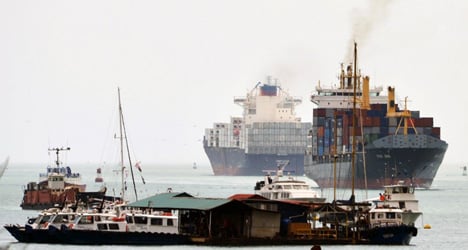Completion could be delayed by three to five years if no agreement is reached, a consortium led by Spanish company Sacyr has warned, citing an estimate by insurance group Zurich.
The threat to the widening of the vital maritime link comes on the 100th anniversary of the opening of the canal, considered an extraordinary achievement of engineering.
The project to widen the canal, one of the biggest civil engineering operations in the world, is due to be completed next year but is bedevilled by a dispute over huge cost overruns.
The canal is a vital link in maritime trade routes being used by 5.0 percent of world shipping.
The canal facilities are being widened to permit the passage of ships carrying up to 12,000 containers, twice the current limit.
But the disputed contract to build locks, due initially to be completed this year, was already running nine months late and since the beginning of this year work has slowed down further.
The consortium of companies undertaking the work, called GUPC, says that unforeseen costs total €1.2 billion ($1.6 billion) beyond the initial €2.36 billion value of the contract.
The announcement from Sacyr hit shares in the company, pushing them down 7.04 percent to €3.604 in early trading on the Madrid stock market which was showing an overall gain of 0.24 percent.
GUPC is in dispute with the Panama Canal Authority (ACP) mainly over who was responsible for the quality of geological information and who should bear the cost of problems and delays arising from unexpected geological problems.
The consortium is proposing that the two sides each pay half of the extra costs until the project is completed.
They would then go before an international arbitration court for a decision on who is responsible for the unforeseen costs and who should pay.
Sacyr said in a statement that the consortium would "continue to seek a solution to finance completion of the project and work in 2015, despite the decision of the Panama Canal Authority to break off negotiations."
It said that the collapse of the talks "puts in danger the widening of the canal and up to 10,000 jobs."
If a solution were not found immediately, the state of Panama and the canal authority would face years of litigation before national and international courts "on the events which have brought this project to the edge of failure," Sacyr said.
The consortium warned at the end of December that it would suspend work in three weeks' time if Panamanian authorities did not provide the extra finance demanded, and the deadline for progress in the talks ended on Tuesday.
The canal, completed in 1914 to offer a short cut and safer journey for maritime traffic travelling between the Pacific and Atlantic oceans, is about 80 kilometres (50 miles) long and is used by 13,000-14,000 ships each year.
Work on building a canal was begun by French interests in 1881 but failed because of difficulties with construction, disease, and bankruptcy for the promoters.
The existing canal was eventually built and completed by US interests in 1914.
In 1999, ownership of the canal reverted from the United States to Panama.



 Please whitelist us to continue reading.
Please whitelist us to continue reading.
Member comments